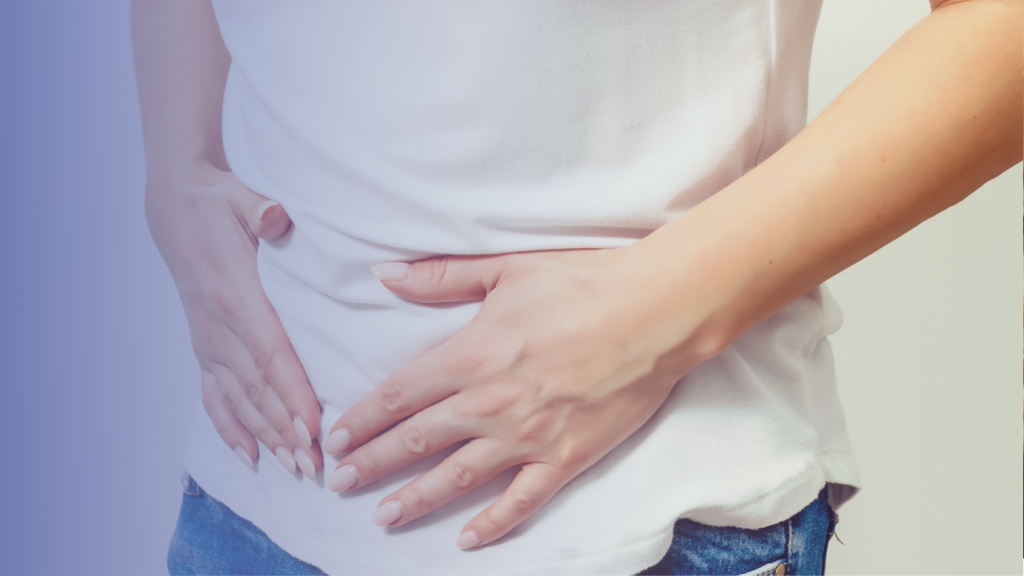Managing indigestion during pregnancy
Pregnancy is a time of big changes, filled with the anticipation of your new baby’s arrival. However, the journey also brings its share of challenges, with indigestion and heartburn often ranking high on the list for many women.[1] If you're curious about why indigestion during pregnancy is so common or whether using Quick-Eze® during this time is ok, read on. You’ll discover the link between indigestion and pregnancy and learn tips to provide the relief you're looking for.
Heartburn and indigestion during pregnancy is a common problem for expectant mothers.[2] It can occur after eating fatty or acid foods and drinking beverages high in caffeine or carbonated drinks.[3]
Symptoms of indigestion during pregnancy may include nausea, bloating, burping or feeling uncomfortably full after eating a meal.[4] Many women also experience pregnancy indigestion at night, which can disrupt sleep and add to the overall discomfort.[5]
By understanding the causes and symptoms of indigestion during pregnancy and knowing that it is a common experience, you can better manage your discomfort and focus on enjoying this special time in your life.
Symptoms and causes of indigestion during pregnancy
Several factors contribute to indigestion and heartburn during pregnancy. Hormonal changes play a significant role, as elevated levels of progesterone relax the muscles throughout the body, including the lower oesophageal sphincter.[4] This relaxation allows stomach acids to flow into the oesophagus, resulting in the characteristic burning sensation of heartburn.[4]
The digestive process may slow down during pregnancy, leading to a buildup of stomach acids.[6] As pregnancy progresses, the expanding uterus pressures surrounding organs, including the stomach and intestines.[7] This pressure can further contribute to heartburn and indigestion symptoms.
Managing indigestion at different stages of pregnancy
During early pregnancy, you may notice symptoms like nausea, bloating, and indigestion ,[7] which can be attributed to hormonal changes and the body adjusting to the pregnancy.[7] As time goes on, symptoms of indigestion may change, with heartburn becoming more frequent due to the growing uterus putting pressure on the stomach and pushing stomach acids upwards.[6]
There are things you can do to manage heartburn and indigestion during pregnancy to ease your discomfort. Making dietary adjustments, such as eating smaller, more frequent meals and avoiding trigger foods can help ease indigestion symptoms.[9]
Additionally, maintaining a proper sleeping position during your pregnancy, such as propping oneself up with pillows, can reduce nighttime heartburn by preventing stomach acids from flowing up the oesophagus while lying down.[9]
Acid indigestion pregnancy remedies
Here are some lifestyle and dietary adjustments that can help manage indigestion during pregnancy:

Portion sizes and mealtimes
Eating smaller, more frequent meals throughout the day can help reduce the likelihood of indigestion. Avoid eating large meals close to bedtime to give your body more time to digest before lying down. Most experts recommend eating a meal two to four hours before bedtime to give your body enough time to properly digest your food.[10]
Avoid certain foods
Spicy, greasy, or acidic foods can trigger indigestion. It’s common to feel a burning and pain in the abdomen after eating a hot spicy meal. Try to avoid these foods and go for more gentle options such as lean proteins, fruits, and vegetables. [11]

Choosing the right foods
Find foods that are easy on the stomach such as yogurt and lean proteins. High-fibre foods like whole grains can also help regulate digestion. Try making a meal with delicious ingredients like leafy greens, red meat and low fructose fruits. And the good news is avocado is a superfood packed with essential nutrients and fibre. [12]

Natural remedies
Sipping on teas after meals may provide pregnancy indigestion relief. Herbal teas typically do not trigger acid reflux symptoms. They are caffeine-free way to make sure you’re drinking enough water. However, teas containing mint or peppermint may trigger acid reflux so try to avoid these. [13]
Quick-Eze®
Antacid tablets can help neutralise stomach acid and alleviate indigestion symptoms during pregnancy.[14]
Ways to prevent indigestion during pregnancy
During pregnancy, indigestion can be a common issue for many women. Here are some tips to help prevent and manage indigestion during pregnancy

Dietary habits
Choose smaller, more frequent meals throughout the day to prevent overloading your digestive system. Eating mini meals is a great solution and a good way to start is by switching from three large meals to four or five smaller meals.[11]
Hydration
Stay hydrated by drinking plenty of water throughout the day. Dehydration can worsen indigestion symptoms, so it's important to maintain adequate fluid intake. Proper hydration is crucial for maintaining overall health and well-being. In addition to lubricating joints and protecting delicate tissues, water helps control body temperature. It also facilitates the breakdown of food and the removal of waste products.[14]

Regular exercise
Engaging in gentle, pregnancy-safe exercises like walking or prenatal yoga can help improve digestion and reduce indigestion symptoms. Try taking a walk after you eat. It’s a good way to decrease stress and improve your digestion.[15]
Prenatal care
Regular prenatal checkups with your healthcare provider are crucial during pregnancy. Be sure to discuss any indigestion symptoms you may be experiencing so that your healthcare provider can provide appropriate guidance and support.
Indigestion, pregnancy and you
Pregnancy is a time filled with joy, anticipation and new experiences. As you navigate this beautiful phase of life, it's common to encounter challenges like indigestion that can sometimes overshadow the excitement of expecting a new life.
Sometimes lifestyle changes and natural remedies may not provide short-term support. antacids such as Quick-Eze® can offer rapid relief from indigestion and heartburn. However, it's important to consult with your healthcare provider before using any medication during pregnancy to ensure it is suitable for you and your baby's well-being. With indigestion taken care of, you can focus on embracing the wonders of motherhood and cherishing the magic of bringing new life into the world.
[1] https://www.nhs.uk/pregnancy/related-conditions/common-symptoms/indigestion-and-heartburn/
[2] https://www.ncbi.nlm.nih.gov/pmc/articles/PMC2821234/
[4] https://www.medicalnewstoday.com/articles/heartburn-during-pregnancy
[5] https://www.nhs.uk/pregnancy/related-conditions/common-symptoms/indigestion-and-heartburn/
[6] https://www.stanfordchildrens.org/en/topic/default?id=pregnancy-and-heartburn-134-10
[7] https://www.pregnancybirthbaby.org.au/indigestion-and-heartburn-in-pregnancy
[8] https://www.webmd.com/baby/pregnancy-discomforts-causes
[9] https://www.nhs.uk/pregnancy/related-conditions/common-symptoms/indigestion-and-heartburn/
[10] https://www.sleepfoundation.org/nutrition/is-it-bad-to-eat-before-bed
[11] https://www.quick-eze.com.au/news/acid-reflux-foods-to-avoid
[12] https://www.hopkinsmedicine.org/health/wellness-and-prevention/5-foods-to-improve-your-digestion
[13] https://www.webmd.com/heartburn-gerd/indigestion-overview
[14] https://www.chcfl.org/can-dehydration-cause-nausea/
[16] https://www.healthline.com/nutrition/walking-after-eating
Frequently asked questions about indigestion during pregnancy
What makes pregnancy indigestion worse?
Factors that can worsen indigestion during pregnancy include eating large meals, consuming spicy or fatty foods, lying down immediately after eating, and stress. Identifying and avoiding triggers that exacerbate indigestion can help manage symptoms more effectively. Poor eating habits, such as eating too quickly or not chewing food thoroughly, can also worsen symptoms.[11] Managing stress through relaxation techniques like deep breathing, yoga, or meditation can play a significant role in reducing indigestion triggers and promoting overall digestive health during pregnancy.
What does indigestion feel like in pregnancy?
Indigestion during pregnancy can feel like bloating, nausea and a discomfort that occurs after eating. It may be accompanied by symptoms such as burping, gas, or a sour taste in the mouth. In addition to these symptoms, you may experience regurgitation of food or a feeling of fullness even after small meals. It's essential to pay attention to these signs and communicate any persistent or symptoms with your healthcare provider to ensure proper management of indigestion during pregnancy.
What can you take for heartburn while pregnant?
During pregnancy, you can consider taking Quick-Eze® for rapid relief. However, it's essential to consult your healthcare provider before using any medication, including antacids, to ensure they are appropriate for your specific situation. Open communication with your healthcare provider ensures the best outcome for your health during pregnancy.
How do I manage acid reflux go away while pregnant?
To manage acid reflux during pregnancy, you can try elevating your head while sleeping, wearing loose-fitting clothing, and avoiding large meals close to bedtime. Identifying and avoiding trigger foods can also help reduce acid reflux symptoms. Furthermore, practicing good posture during and after meals can help prevent acid reflux by promoting proper digestion.[7] Engaging in gentle physical activity, such as walking, can also aid in reducing symptoms of acid reflux during pregnancy.[16] It's important to listen to your body and make lifestyle choices that support your digestive health.
How do I ease indigestion in pregnancy?
To help ease indigestion during pregnancy, you can try eating smaller, more frequent meals, avoiding trigger foods that worsen symptoms, such as spicy or fatty foods, and staying upright after eating. [11] Quick-Eze® can provide rapid relief, but it's important to consult your healthcare provider before taking any medication during pregnancy. In addition to dietary adjustments and antacids, staying hydrated throughout the day can also aid in digestion and helps prevent indigestion.[15] Drinking plenty of water between meals can help maintain proper hydration levels, support digestive function, and reduce the likelihood of experiencing discomfort related to indigestion during pregnancy.






